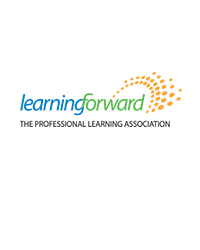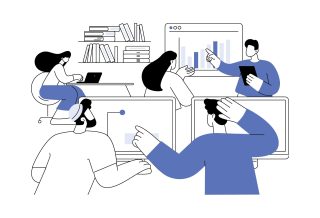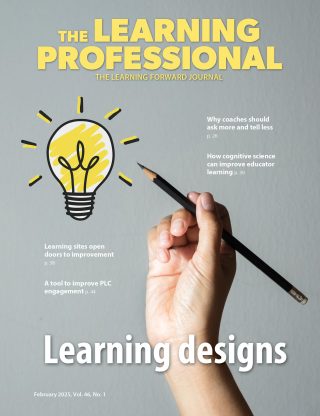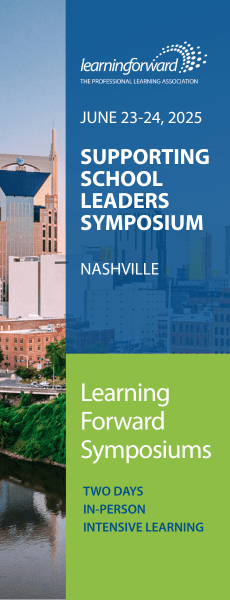Jessyca Mathews’ father always knew she would become a teacher, but she wasn’t so convinced. When Mathews’ path did lead her to education, she decided not only to teach in her hometown of Flint, Michigan, but in the school she had attended, Carman-Ainsworth High School. “I wanted to go back and be what I didn’t have,” she says now. What she didn’t have was a single Black educator from K-12. As a result, she felt that many aspects of her identity were questioned or misunderstood.
Mathews is now an award-winning educator who was Michigan’s 2018 Secondary English Teacher of the Year and a finalist for 2019 Michigan Teacher of the Year. She has received numerous accolades and extensive media coverage for the work she did to help her students write about the Flint water crisis. She is also a prolific writer, speaker, and advocate for social justice and what she calls “good trouble” — a reference to the phrase used by the late civil rights leader and Georgia Congressman John Lewis.
Mathews will be a keynote speaker at the Learning Forward Annual Conference on Dec. 5 in Nashville, Tennessee. The Learning Professional spoke with her recently to hear more about her journey and the themes she plans to touch on at the conference. That conversation has been edited for publication.
What is “good trouble,” and how did you decide to make it part of your work as a teacher?
Good trouble is about standing up for what’s right, helping people find their voices, and speaking truth to help make the world a better place. In our current environment, there are so many things that are going against speaking truth, celebrating diversity, pushing toward equity. For educators everywhere, there’s a sense of fear and of being blocked from teaching truth. Making good trouble is about countering that fear.
I wasn’t always the good trouble teacher. It’s been part of the journey. In the beginning of my career, I was focused on being the right role model for kids in my community. But I realized it’s bigger than that. With the low number of Black teachers in education, I have to think about how to make a bigger impact.
Making good trouble comes in various ways. Sometimes it’s about me questioning things, going to my administration to ask questions and push back on things. But a lot of the time, it’s about me helping young people, my students, make good trouble. They’re better at it than us! They’re more passionate than us. They’re not afraid. They’re not going to be ignored. That’s one thing I love about Gen Z: They’re ready to make change.
You’ve said that the turning point for you in making good trouble was the Flint water crisis, when a change in the city’s municipal water supply caused pipes to corrode and lead leached into the water, causing physical and behavioral health problems for thousands of people. How did that crisis change your teaching?
The water crisis is such a devastating thing that happened in my community. I experienced it personally, and my students experienced it. I saw cloudy water in my faucet and brown water coming from the hydrants. I went to a water station for the first time, and what I saw felt very much like the Third World. So my students and I talked about it. We talked about it way before the crisis got national exposure.
Knowing that almost 90,000 folks in my city could be poisoned and people didn’t even want to talk about it or hold anyone accountable, I felt uncomfortable teaching the same old standard things without addressing what was going on. I looked at some of the things we were supposed to teach, and I thought, “Why would my kids care about that when they are telling me stories of hair loss, rashes, dental issues, miscarriages in their families?”
I thought about what my role was. I thought, “You can teach well and write well. How can you take those things to start to develop young people’s voices about what’s going on?” That’s how I decided to work with the kids on writing about the crisis.
I went to my administrator and said, “I want to try something new and make a shift.” I did my research first, and I presented my sources and explained what I wanted to do. I was teamed up with Michigan State University, where they had a grant to focus on developing voices around what was going on, and with another school in Lansing. Having that partnership and investment from the university was a huge part of allowing the shift to happen because we had support and credibility.
It was all about lifting up the students’ voices, and learning together how to be advocates. Allowing my students to talk, hearing their stories, sharing mine, and learning how to advocate was life-changing for me and my students.
What do you say to people who criticize this work as too political?
Education has always been political because we function in a biased political system. Our education system was not built for BIPOC people, and that’s a problem we have to talk about.
We are a community in the real world, and politics is there. The fact that my students don’t have the same things as students at a school 15 minutes away is political. The fact that I am oppressed by certain laws is political. I have to share that narrative. My white students might not even know that narrative if I don’t share it.
No one can tell me not to function in the system that I’m giving my life and my passion to. No one has the right to tell me that the things that have happened in my life should not be said to my students for growth, learning, and understanding. I don’t have to put my political affiliation out there, but I can share my story — and I want students to share their stories.
Many other educators are weathering crises and controversies in their own communities. What is your advice to them about navigating these situations, especially when they fear backlash?
I always tell people that doing small, supplemental things can make a difference. If you’re not allowed to have that book on your shelf, go find an article that you can tie into what you’re doing. Talk about examples of justice in the community. There’s always social justice, as much as some people want to suppress it.
I also study the Common Core State Standards and tie what I’m doing to them. I can say, “It says very clearly right here that students need to do argumentative writing, and that’s what I’m teaching.” I show that what I’m doing is what I’m required and expected to do as an educator.
I encourage teachers to get involved outside the classroom, too. No one can stop you from reading about certain topics in your own home or being part of a book club. They can’t stop you from informing yourself and talking to other people, which is the real way people learn.
Instead of thinking about the barriers in front of you, I tell people to think about all the open space you actually have.
With all that’s going on in schools, and all the stresses teachers are facing, they need and deserve support. How can we make sure professional learning is meaningful and doesn’t feel like just one more thing to do?
If you are focused on the right things, educators will gravitate to professional learning. But rarely are teachers asked what they need. Administrators and professional learning staff need to ask teachers, “What do you need at this moment?” They need to acknowledge teachers’ worries, concerns, areas they want to grow in. If you listen and provide that, teachers will come and engage.
But also, professional development doesn’t need to be just what’s given to you in your school district. Professional development is about reflecting on yourself. It’s about asking yourself, “What areas do I need to build up?” and then learning with people who are like-minded. The majority of my growth in the last 10 years has been a result of me going to conferences and engaging with people on Twitter.
We all have to seek more. That’s what we would want from our students. If you’re telling them to seek more, why won’t you do it?
In addition to teaching students, you have led professional learning for other educators. What do you focus on and why?
I just led a professional learning session at my school that was about “How can we liberate our kids?” Having those conversations with teachers is so important, but it’s challenging. It’s very different than the work I do with kids. With kids, I can talk very comfortably, and kids are willing to process. But educators sometimes come in with a specific vision of what education has to be, and it’s hard for them to break that.
When I work with educators, I tell them, “I’m going to challenge your whole educational experience. I’m going to point out some of the things you’re doing in your classroom, and it will probably hurt your feelings a little bit.” To do this work right, you have to make them uncomfortable. Sometimes they’re willing to take it, and sometimes they’re offended and feel attacked. But they’re not being attacked. There’s a difference between being attacked and being challenged.
After the session, many people reached out to me and thanked me for pushing them. They said that the things we talked about are what they need to know and do this school year. They appreciated that it was responsive to their needs and that they could use it immediately.
You write a lot about teaching, social justice, and empowering students. Why do you think it’s important for educators to be writers and advocates?
It’s really important for us, as teachers, to write and to share our stories. I know it can be terrifying to tell your stories because you are opening yourself up to so much vulnerability. But if we don’t share our stories, someone else is going to make the narrative for us. We already have people trying to do that. If we are not open and honest and raw about the things we experience in education, nothing will shift.
I tell people that the first step is to take some personal time to reflect. Some people put everything out there on social media without reflecting on it. You have to first get your words down for yourself. Write in a journal, even just one sentence, or put notes in your phone. Once you’re comfortable writing down the things coming into your head, then you start to think about whether you want to put it out there, and you think about what audience you want to hear your message.
I also tell people you don’t necessarily have to write it. If that’s not your skill, vlog it or do a podcast, or make a beautiful piece of art for people to discuss. There are so many different ways for us to tell our stories.
You’ll be sharing more about your journey and your advice at this year’s Learning Forward Annual Conference. How does the conference theme, “Reimagine,” resonate with you?
There are a lot of “re” words we should be using in education right now. Reimagine is one. Reconstruct is another. If we don’t demolish some of the systems that are holding people back, we’re contributing to harm. Education was never developed for BIPOC individuals to succeed. We need to have some very open and genuine conversations about that.
One of the big problems is that we still have education systems that are majority white. We have to get more diversity in the education profession. In Michigan, where I teach, 91% of educators are white. So I’m always asking, “What are we doing to make education more diverse? What are we doing to encourage diverse young people to go into this profession and see that they are needed?”
I’m very passionate about this. Because why would someone want to go into teaching right now when they can go into other professions and be more protected and earn more money? We’re asking young people to walk into spaces that are dangerous in many ways, especially for BIPOC educators. We need to help young people feel, “I still need to do this,” or help them change their thinking to say, “With all that’s going on, I am needed.”
Making education more diverse matters. I recently posted a picture on Facebook of the Black staff members in my building with the caption, “Black excellence in the teaching staff is happening.” It used to be just me, but now there are seven of us. I had kids and former students commenting left and right about how happy they were to see that. To have people who look like you, who understand what you’re going through — it seems like a small thing, but it’s so important.

Learning Forward is the only professional association devoted exclusively to those who work in educator professional development. We help our members plan, implement, and measure high-quality professional learning so they can achieve success with their systems, schools, and students.
Recent Issues
BUILDING BRIDGES
December 2024
Students benefit when educators bridge the continuum of professional...
CURRICULUM-BASED PROFESSIONAL LEARNING
October 2024
High-quality curriculum requires skilled educators to put it into...
LEARNING TO PIVOT
August 2024
Sometimes new information and situations call for major change. This issue...
GLOBAL PERSPECTIVES
June 2024
What does professional learning look like around the world? This issue...












